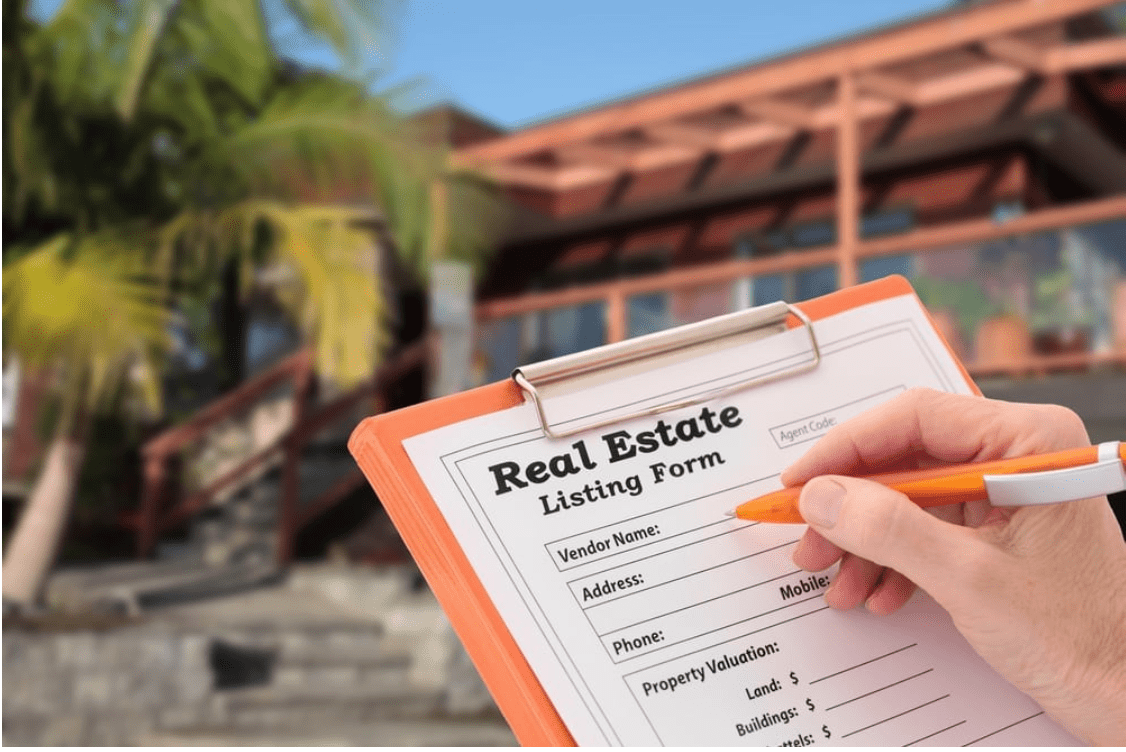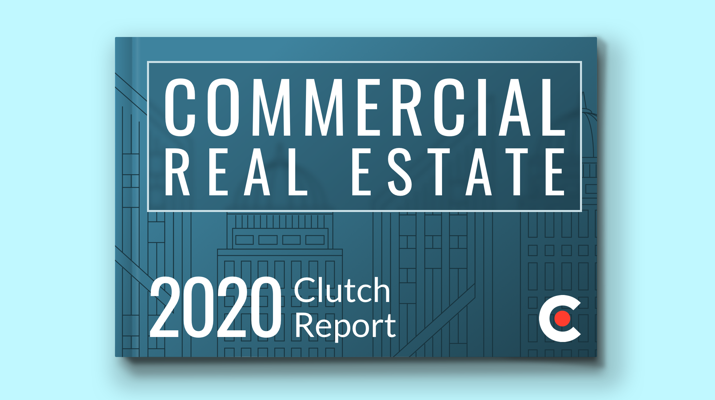![How to Budget for A Business Relocation [With Template]](https://img.shgstatic.com/clutch-static-prod/image/resize/715x400/s3fs-public/article/da44ab3f488dff79138f31d3d3df081c.png)
![How to Budget for A Business Relocation [With Template]](https://img.shgstatic.com/clutch-static-prod/image/resize/715x400/s3fs-public/article/da44ab3f488dff79138f31d3d3df081c.png)
Updated February 23, 2026
The world of real estate is complex. To better understand the world of real estate for your next commercial purchase, explore our glossary of real estate terminology.
Despite setbacks during the height of the pandemic, the commercial real estate industry is looking to bounce back.
With hybrid working being here to stay, companies are looking to invest in more affordable office spaces.
Looking for a Real Estate agency?
Compare our list of top Real Estate companies near you
For businesses starting to branch out in the world of real estate, it is important to be knowledgeable about the ins and outs of real estate.
Explore our real estate glossary to ensure your team is set for success.
Adjustable-rate mortgage: A mortgage that begins with a lower interest rate than a fixed-rate mortgage but changes over time based on the market.
Amortization: A payment schedule outlining what goes into the principal and interest balance.
Annual percentage rate (APR): The annual cost of a loan expressed as an interest rate, which includes fees, closing costs, and more.
Appraised value: An appraisal is an expert’s opinion of a property’s market value.
Assessor: An individual that calculates the value of a property
Assessed value: A professional estimate of a home’s market price for property tax purposes.
Backup offer: If a buyer wants to buy a space that’s already under contract, they can request to be “next in line” by submitting a backup offer.
Blind offer: If a person or business puts an offer in without seeing in person, this is a blind offer.
Borrower: If an individual pays for a property using a loan, they’re referred to as a borrower.
Broker: An individual representing another person or company during the buying or selling process.
Brokerage: A firm that acts as a middleman to connect buyers and sellers to make a transaction on a property.

Building classifications: there are three classes of buildings that tenants can consider for their property
Build-to-Suit: A property that’s developed for a certain tenant to occupy with structural features and improvements specifically for that client.
Buyer’s agent/listing agent: A licensed real estate professional that’s job is to locate a buyer’s next property.
Capitalization rate: Also known as “cap rate,” which refers to the ratio of Net Operating Income (NOI) to property asset value.
Cash reserves: The amount of money set aside by businesses in case of emergency
Chain of title: A document that contains all previous property owner information in chronological order.
Clear title: A title that shows the undisputed, legal property owner
Commercial leases: A leasing agreement that’s specific to commercial real estate
Commission: Payment based on the completion of a sale.
Common Area Maintenance (CAM) Fees: All the costs of operating the commercial property – these fees include maintenance.
Comparative market analysis: A process used to determine the value of a property based on the prices of similar properties in the area.
Contingency: A condition that must be met before a sale is legally binding. For example, completing a building inspection.
Covenants: An agreement between two or more parties regarding the use of a piece of real property.
Closing costs: An assortment of fees that are paid at the time of closing on a real estate transaction.
Creditor: The individuals who loan money; these creditors can be banks, finance companies, friends, or family.
Curb appeal: The appearance and overall attractiveness of a property’s exterior.
Deed of trust: A legal document that shows property ownership.
Default: When a borrower fails to make several payments over a period of time.
Depreciation: The process used to deduct the costs of buying and improving a rental property.
Discount points: Points that lower your interest rate in exchange for paying a fee upfront.
Down payment: A percentage of the home’s sale price paid upon closing to secure a loan.
Dual agency: A situation where a broker represents both the buyer and seller.
Earnest money: Part of a down payment that’s paid before closing to show the commitment to purchasing a space. This is also known as a good faith deposit.
Easement: A non-possessory interest in a real property that allows one or more individuals to use a piece of property for a specific purpose.
Encroachment: An unauthorized intrusion into a neighboring property through the creation of a physical structure.
Encumbrance: A claim against an asset by an entity that’s not the owner
Eminent Domain: The government has the right to take private property and convert it for public use if it compensates the owner fairly.
Escrow: A legal arrangement where a third party holds large funds until the terms of an agreement are met.
Equity: A measure calculated by taking a property’s market value and deducting the amount that’s still owed on the mortgage.
Fair market value (FMV): The determined price that a property sells for in an open market.
Fee simple: The complete and total ownership of a piece of land or properties.
Federal Housing Administration (FHA): A government organization that is part of the U.S. Department of Housing and Urban Development.
FHA loans: A group of loans that are insured by the federal government that cover losses that might happen in the event that the borrower doesn’t fully repay the loan.
Fixed-rate mortgage: This type of mortgage guarantees one interest rate for the duration of your loan. With a fixed-rate mortgage, the monthly principal and interest never change.
Full-service (FS) rental rate: A rate that includes all operating expenses for a rental property
Foreclosure: When a borrower fails to make agreed-upon payments to the lender, the lender can take possession of the property or space.
Gross income: The effective gross income is the amount of money that a rental property is expected to generate.
Insurance policy: A policy that protects property owners by providing coverage for the buildings or properties they use for space.
Interest: The profit a mortgage lender makes in exchange for the loan
Landlord: The property owner that’s rented or leased to a tenant.
Leaseback: Often called a rent back, seller leaseback, or sales leaseback; a transaction in which the seller sells the property and then leases back the property from the new owner.
Lender: A financial institution that offers loans or other credit lines.
Letter of Intent (LOI): A written document that reinforces the lessor’s commitment to lease the property
Line of credit: A financing option that allows investors to tap into a property’s equity like a business credit card.
Listing: A property that’s up for sale.
Listing agreement: A legally binding contract that allows a real estate agent to sell on behalf of the property owner.
Mortgage broker: A person who works with multiple lenders to find the product that works best for the client.
Mortgage lender: A financial institution or mortgage bank that offers and underwrites property loans.
Mortgage loan: A loan to purchase or refinance a property.
Multiple listing service (MLS): A database of current real estate listings that’s operated by a group of agents.
Net Operating Income (NOI): A value that determines how much profit a commercial real estate property generates.
Occupancy cost: The costs related to occupying a space, which can include: rent, real estate taxes, insurance, and personal property taxes.
Offer: The plan or estimate a buyer makes on a property that they want to purchase. The offer can be full list price or something deemed a fair market value.
Open listing: A situation in which a property owner chooses to sell on their own, which means that they can have listings with different agents.

Option to Buy: When the tenant has the contractual option to buy at the end of the lease term.
Origination fee: What the lender charges the borrower for making the mortgage loan.
Parking ratio: The available parking spaces reserved for tenants.
Personal property: Falls into two categories
PITI (Principal, Interest, Tax, Insurance): The four elements of a monthly mortgage payment.
PMI (Private Mortgage Insurance): A policy that protects a lender in case a loan is defaulted on.
Pre-approval: The process of establishing what a borrower can reasonably afford when taking out a loan.
Principal balance: The amount owed to the lender outside of interest.
Promissory note: The document that creates the loan obligation
Property asset value: The total value of an asset, minus any outstanding debt
Property owner: A person that owns a building, home, or land
Property taxes: Taxes paid on property owned by an individual or entity.
Public records: Any record of data that is maintained by the county or city as part of the real estate records.
Purchase price: The amount an individual agrees to pay the seller.
Real estate agent: An individual who is licensed to represent a buyer or seller in a real estate transaction.
Real estate transaction: The process where the rights in a unit of property are transferred between two or more parties.
Refinance (refinancing): Obtaining a new loan to pay off an original loan on the same property.
Repayment term: The period from the starting point of credit to the final maturity of a transaction.
Rentable square footage: the usable square footage plus the part of the space that will be shared among the tenants, including hallway bathrooms, cafeterias, etc.
Sale price: The price that the buyer actually pays for the property.
Short sale: A property that’s sold for less than the amount owed on the mortgage.
Specified time: The specified period where the payment is provided, which is listed in the agreement.
Tenant: An individual, business, or group that pays rent to an owner or landlord to occupy a space.
Title company: A third party that works on behalf of the lender and the buyer to insure the title of the property.
Title insurance: A type of insurance that protects the buyer and lender in the situation where the seller doesn’t have full lawful ownership of the property.
Title search: A search examining public records for a property's history.
Underwriting: The process used to determine loan conditions and protect lenders from financial risk.
Usable square footage: The amount of space that’s being leased.
Vacancy rate: The percentage of physically vacant space divided by the amount total of existing inventory.
Value of the property: The property value or estimate of any real property or building.
Warranty: A legal document used when a piece of real estate is sold.
Zoning: The process of partitioning an area into reserved zones for different purposes.
In need of a commercial real estate developer for your business? Browse our directory of the top companies.
Additional Reading:
![How to Budget for A Business Relocation [With Template]](https://img.shgstatic.com/clutch-static-prod/image/resize/715x400/s3fs-public/article/da44ab3f488dff79138f31d3d3df081c.png)

